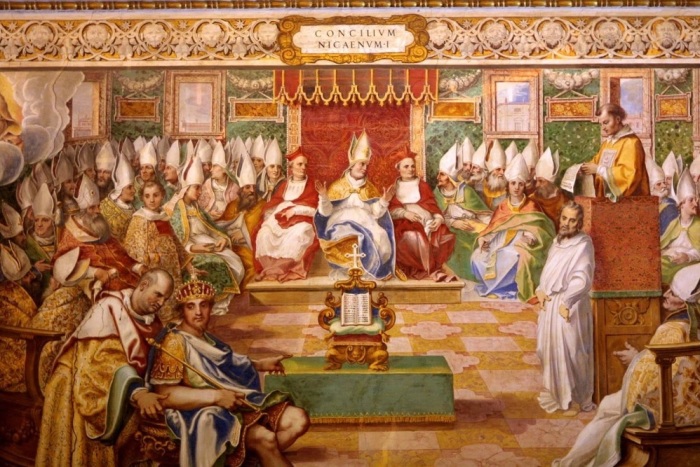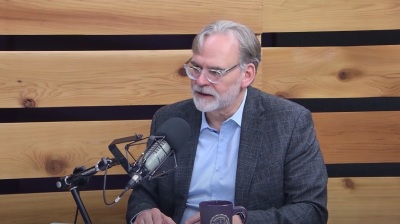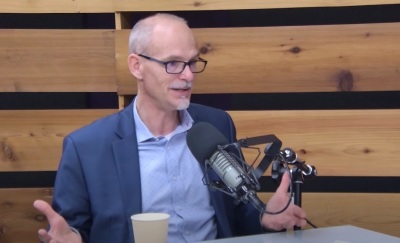
Theologians have refuted misconceptions about the Nicene Creed and the council in 325 that created it, as many churches celebrate the 1,700th anniversary of the influential document.
In a recent episode of the Dallas Theological Seminary’s “The Table” podcast, Malcolm B. Yarnell III, research professor of systematic theology at Southwestern Baptist Theological Seminary in Fort Worth, Texas, and Michael J. Svigel, DTS professor of historical and systematic theology, discussed the Nicene Creed’s origins and impact on modern society.
Yarnell explained that while it was “the most universally accepted creed” in Christianity, “it has been challenged at various points through Christian history.”

In modern times, Yarnell pointed to examples of the Church of Jesus Christ of Latter-day Saints and the Jehovah’s Witnesses as groups that reject key elements of the Nicene Creed, namely the doctrine of the Trinity. Both groups claim to be Christian but are incompatible with biblical Christianity.
Svigel warned that “even in what would be regarded as conservative Christian circles,” one can find teachers who are “reconstructing the history of the Church in a pretty slipshod manner.”
For example, Svigel critiqued the claim that, before the 325 Council of Nicaea, the early Church “weren’t really Trinitarian,” countering that, actually, the creed was “articulating in precise language what the Church has explicitly been teaching.”
“The Father is God, the Son is God, the Spirit is God. The Father’s not the Son, the Son’s not the Spirit, the Spirit’s not the Father. There’s one God, not three Gods. The Church has consistently been teaching that,” he stated.
“Sometimes this sloppy thinking, even among Christians who think, ‘well, the Church became Trinitarian, and therefore if the first three centuries weren’t Trinitarian, then maybe it’s optional.’ … They don’t take it as seriously. … The role of the creed was not to establish something new. That’s not what it did.”
Yarnell took issue with the claim among some that the Nicene Creed is a “Western imposition” on other parts of the world, noting that the Council of Nicaea was mostly non-Western European.
“The bishops at both the Nicene council of 325 and the Council of Constantinople of 381 are primarily Eastern. There were Western representatives, but they’re primarily Eastern bishops,” Yarnell explained.
“Moreover, the leading theologians of the early church, both with regard to Trinity and Christology, which became a major conversation in the fifth century, are Africans.”
While considered an ecumenical Creed, many churches, especially Protestant and Evangelical nondenominational congregations, do not recite the Nicene Creed as part of worship.
For example, recent efforts within the Southern Baptist Convention to add the Nicene Creed to the 2000 Baptist Faith & Message have not been successful, due to various reasons.

Svigel argued that creeds like the Nicaean one can help “balance the Christian faith and also balance our reading of Scripture,” while Yarnell believes they can help guide a new believer who is starting to read the Bible.
“When somebody comes to start reading the Bible and they start importing all sorts of ideas, especially from their own contemporary culture and determining, ‘that’s what the Bible means,’ when actually the Bible’s not even talking about that. Or they take an issue that is a narratival issue, and they become so wrapped up in that that they forget what is the core message of Scripture,” Yarnell explained.
“So, I think Svigel’s right, they have a hermeneutical guiding function to let you know this is the main road. And it also helps you avoid the errors of falling off into the ditches as well, into extremes, into things that are not really part of the faith.”
Yarnell also noted that, for his classes, he advises his students “to memorize one of the creeds, especially either the Apostles’ Creed or the Nicene Creed, as they prepare to teach and to preach.”
“I really believe that the creeds help us to identify and remember the central teaching of the biblical text, the apostolic preaching, the preaching of the Gospel of salvation,” he added.
The podcast episode comes as churches across the world celebrate 1,700 years since the First Council of Nicaea met in modern-day Turkey and crafted the Nicene Creed.
Called by Emperor Constantine the Great and held shortly after the Roman Empire had legalized Christianity, the fourth century gathering came in response to the rise of Arianism, an early church heresy that claimed that Jesus Christ was created by God, rather than being coeternal.
The Nicene Creed reaffirmed the orthodox belief that Jesus was “God from God, Light from Light, true God from true God, begotten, not made, consubstantial with the Father.”
In April, the Roman Catholic Church’s International Theological Commission released an official document highlighting the significance of the council and the creed, and providing resources on the topic.
“The faith that the Council of Nicaea witnesses to and hands on is the truth of a God who, being Love, is Trinity, and who, out of love, becomes one of us in his Son,” stated the ITC in a press release.
“The Nicene Creed thus stands at the heart of the [Catholic] Church’s faith as a wellspring of living water to be drawn upon also today. Through it, we can enter into Jesus’ gaze and, in him, into the gaze with which God, Abba, looks upon all his children and upon the whole of creation, starting with the least, the poor and the outcast.”

















